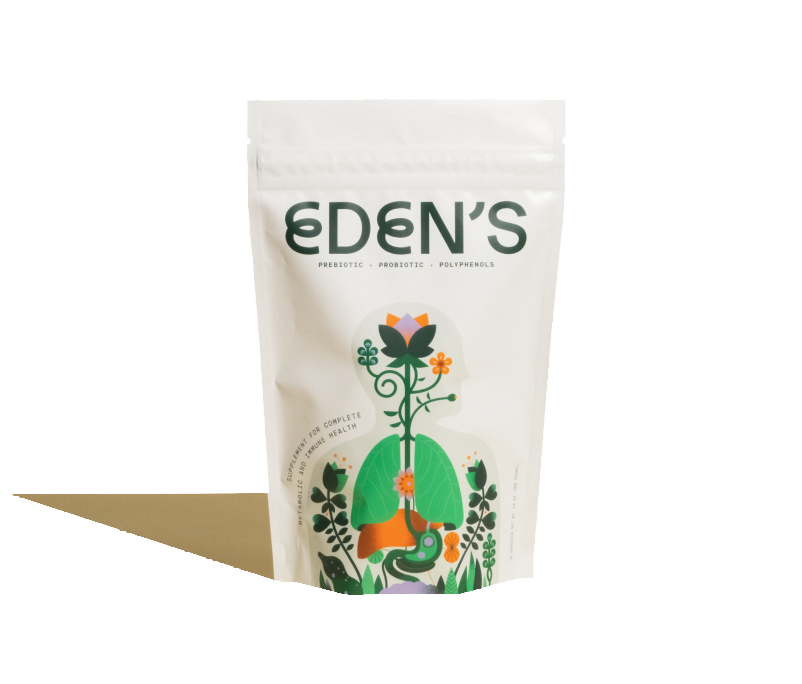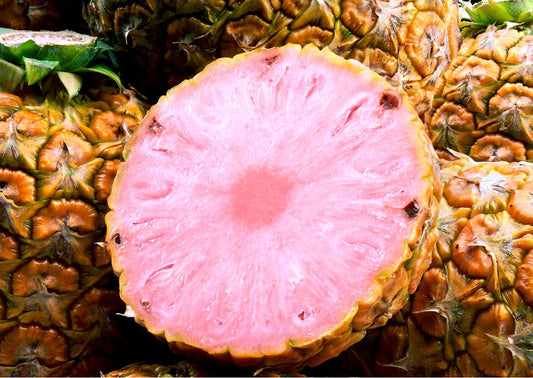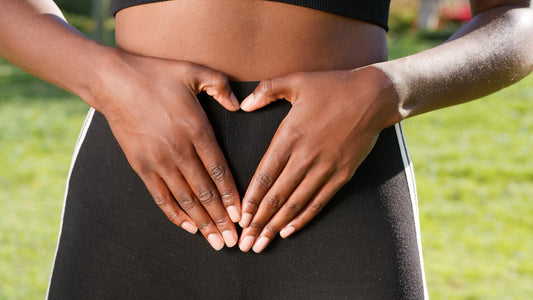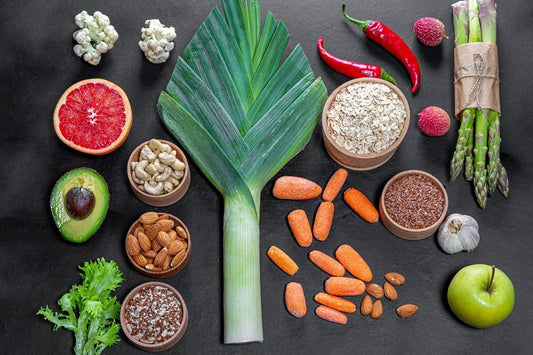Microbiome 101

In this episode of Eden's ingredient spotlight, we're going to focus on yeast — specifically probiotic Saccharomyces boulardii. Let's dive in and discuss why we chose this specific yeast in Eden's.
Saccharomyces boulardii, or S. boulardii — a species of yeast — is a probiotic (beneficial bacteria) known to help with many gastrointestinal (GI) disorders, particularly the symptoms of diarrhea, bloating and flatulence so prevalent in irritable bowel syndrome (IBS) and certain types of inflammatory bowel diseases (IBD), particularly ulcerative colitis (UC). This subspecies of Saccharomyces cerevisiae (known as brewer’s or baker’s yeast) has unique features that allow it to thrive in the human gut, promoting better immune modulation, anti-inflammatory properties, and the production of specific, beneficial bioactives. All told, S. boulardii is a “gut-comfort” probiotic. While S. boulardii has been found in lychee and mangosteen fruits, as well as fermented products like kombucha and kefir, it can be difficult to obtain the right dosage to capture its probiotic benefits.
Uniquely, Eden's synbiotic supplement contains a carefully selected and scientifically tested formulation of four probiotics (including S. boulardii), five prebiotics, and five polyphenols, targeting enhanced gut health and the mass of health benefits that flow from it.
What are probiotics?
Probiotics are naturally-occurring, friendly bacteria that produce metabolites (such as short chain fatty acids, or SCFAs) that promote regularity, ease gas and bloating, generate energy, and boost a healthy immune system. Beneficial bacteria work by crowding out the bad bacteria so that they can’t produce endotoxins that result in chronic inflammation and disruptions to barrier integrity. The World Health Organization (WHO) has officially defined probiotics as “live microorganisms which, when administered in adequate amounts, confer a health benefit on the host.”
While the potential for probiotics to provide benefits to healthy people and help prevent disease and disorders is still an ongoing area of research, what has become widely accepted is the premise that the intake of probiotics aids in the restoration of a balance between “good and bad gut microflora” following a disturbance that affects barrier immunity. This ability of probiotics to help restore the balance of microflora in your gut, which in turn lets your gut produce more of the beneficial byproducts that may help fight disease, most notably results in relief from the symptoms of various GI disorders — to date, the most medically accepted benefit of probiotics. The most commonly used probiotics are those from lactic-acid-producing bacteria species — Lactobacillus, Bacillus, Bifidobacterium, Streptococcus, and Enterococcus are among the most studied — usually ingested from fermented foods (such as yogurt, kimchi, kefir, miso). Learn more: Probiotics 101: Your ultimate guide to probiotics.
S. Boulardii yeast: A probiotic with unique clinical value
S. boulardii was discovered in the tropics in 1920 by a French scientist who observed that people who drank tea made from the skin of a certain tropical fruit didn’t suffer from disease during a cholera outbreak. A yeast, S. boulardii has in recent years been shown to be efficacious in treating several GI disorders, and it can be especially powerful when used in conjunction with other probiotics. Unlike most other yeast species, S. boulardii can act as a probiotic (conferring a health benefit to its host) because it is:
-
Resistant to gastrointestinal enzymes, bile salts and variations in pH and temperature, which ensures that this yeast probiotic can reach the colon almost intact.
- Able to function during antibiotic use, as yeast is naturally resistant to antibiotics.
There are decades of reliable clinical trials showing specific probiotic advantages of taking S. boulardii, often discussed as an antimicrobial and anti-toxin because it:
- Stimulates good gut bacteria: S. boulardii supports gut bacteria that keep you from being sick, promotes nutrient absorption, and enhances digestive health. The yeast helps modulate your gut’s metabolism and strengthens the gut’s lining. It has also been shown to help increase the production of short-chain fatty acids (SCFAs), key components of a healthy gut microbiome and critical to combating gut “dysbiosis,” the clinical term for an unhealthy gut microbe imbalance. Studies so far have mostly indicated that changes in gut microbiome composition are noted in subjects with various GI disorders, but not in already healthy subjects.
- Is involved in immune response regulation: S. boulardii can act as both an immune stimulant and a pro-inflammatory inhibitor because it helps fine-tune some of your immunological pathways that become active during infection and disease. This yeast can signal to immune proteins, called cytokines, to fight off specific pathogens or stimulate anti-inflammatory levels of specific cytokines in other states, depending on your body’s needs. Learn more: Does gut health impact immunity?
- Weakens pathogens: Researchers have proposed that S. boulardii can be effective in fighting malignant bacteria, other yeasts and viruses because of its ability to stick on to and eliminate these cells, decreasing their virulence and toxicity in addition to stimulating an immune response.
-
Prevents and treats diarrhea: Multiple human clinical trials have found that taking S. boulardii can help prevent and treat various types of diarrhea, including:
- Antibiotic-associated diarrhea
- Clostridium difficile-associated diarrhea
- Traveler’s diarrhea
- Acute diarrhea in both adult and children populations
- Tube feeding-associated diarrhea
- Aids in treating certain bowel disorders, particularly ulcerative colitis (UC) and irritable bowel syndrome (IBS): S. boulardii has been shown to decrease intestinal permeability, thought to be mainly due to its ability to strengthen mucosa on intestinal walls and decrease inflammation. In the inflammatory bowel disorder (IBD) arena, clinical trial data points to a possible role of S.boulardii in reducing treatment relapses in UC, although the data for Crohn’s remains mixed, and further studies are required to reach compelling conclusions. IBS symptoms do seem to improve with S.boulardii administration. IBS is a condition frequently characterized by abdominal bloating, abdominal pain, and disturbed intestinal transit.These symptoms were shown to be alleviated in 50% of patients upon S.boulardii use.
Eden’s 3-in-1 Synbiotic
While S. boulardii has been found in lychee and mangosteen fruits, as well as fermented products like kombucha and kefir, it can be difficult to obtain the right dosage to capture its probiotic benefits. Uniquely, Eden's synbiotic contains a carefully selected and scientifically tested formulation of four probiotics (including S. boulardii), five prebiotics, and five polyphenols, targeting enhanced gut health and the mass of health benefits that flow from it. Learn more: What is a synbiotic?
To be considered a probiotic, the bacteria must confer a specific and proven benefit onto the host, and different probiotic strains offer different benefits. Eden’s blend has three other probiotics beyond S. boulardii that offer a long list of direct and indirect benefits. We’ve summarized the direct benefits here:
|
S. boulardii |
Stimulates good gut bacterial growth, improves nutrient absorption, and prevents diarrhea. |
|
Bacillus coagulans SC208 |
Reduces triglycerides, visceral fat, and improves gut health and digestion. |
|
Lactobacillus rhamnosus GG (LGG) |
Helps to prevent and eliminate pathogenic bacteria, restores gut to a healthy condition, and strengthens immune responses. |
|
Lactobacillus paracasei (LPC-37) |
Strengthens the intestinal barrier, immune system, and improves nutrient absorption. |
What are the side effects of yeast probiotics?
There have been no notable negative side effects from S. boulardii yeast reported in clinical research trials, but speak to your medical provider before taking any probiotic or supplement: in certain cases, your health status may increase your risk of side effects or complications, especially if you’re pregnant, breastfeeding, immunocompromised, or have a yeast allergy.
Key takeaways
S. boulardii is a probiotic yeast that is especially effective in restoring gut health, particularly since it is relatively unaffected by antibiotic compounds. S. boulardii can help restore your GI tract lining, improve nutrient absorption, and enhance the production of important metabolites (such as SCFAs) that are critical components in long-term gut (and overall) health. Most notably, S. boulardii has been shown to significantly relieve the symptoms of diarrhea, bloating and flatulence so common in many GI disorders, including IBS. If you wish you could get more “gut comfort” on a regular basis, consider a daily supplement that includes this unique yeast probiotic; better yet, ask your healthcare provider if a synbiotic blend (such as Eden’s) that incorporates this and other probiotics, prebiotics, and polyphenols could be a worthwhile way to enhance a healthy diet and lifestyle.



